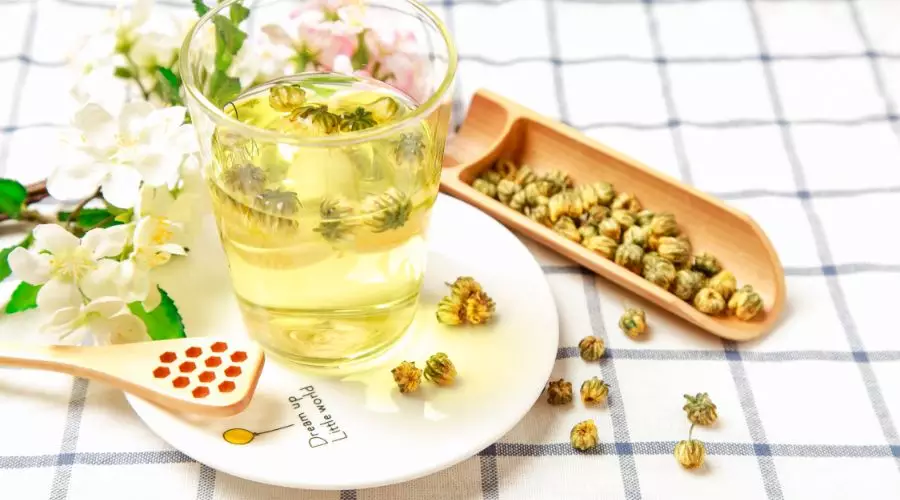Today, I would like to share the efficacy and contraindications of the four common flower teas.
1. Chrysanthemums

Chrysanthemums are dried head-shaped inflorescences of Asteraceae plants, mainly produced in Zhejiang, Anhui, Henan and other provinces. According to the different origin and processing methods, medicinal materials are divided into "milli chrysanthemum", "Chu chrysanthemum", "Gong chrysanthemum", "Hang chrysanthemum", etc., with "milli chrysanthemum" and "Chu chrysanthemum" with the best quality. Due to the different colors of the flowers, there are yellow chrysanthemums and white chrysanthemums.
Effect: Disperse wind and heat, calm the liver and eyesight. It is used for wind fever colds, headaches, dizziness, redness and pain in the eyes, and dizziness.
taboo:
1, chrysanthemum cold, pregnant women are best not to use.
2. People with allergies should use with caution, and there have been clinical reports of allergies caused by taking chrysanthemums.
3. People with yang deficiency are prone to damage to righteous qi, especially those with spleen and stomach deficiency and cold are also prone to stomach discomfort.
4. Chrysanthemum is cool, long-term drinking is likely to stimulate gastric acid secretion, so that pharyngeal inflammation persists.
5, chrysanthemum taste cool, not suitable for people with cold and cold to drink.
Chrysanthemum Mingmu Tea:
Ingredients: White chrysanthemum, goji berries
Preparation method: Put the white chrysanthemum and goji berries into a cup and brew in boiling water
Function: evacuation of wind and heat, clear liver and eyes, beauty and beauty
2. Honeysuckle
Honeysuckle, just called honeysuckle. Because honeysuckle flowers are white at first and turn yellow later, they are named honeysuckle. Honeysuckle is a honeysuckle of the honeysuckle family and dried buds or flowers with their first blooms.
Efficacy: detoxification, evacuation of wind and heat, cool blood and diarrhea, blood lowering, pharyngeal diaphragmatic effect; used for warm fever, hot poison blood diarrhea, carbuncle, swelling poison, fistula, hemorrhoid leakage.
1, honeysuckle cold, can spread wind and heat, generally used for a variety of heat and venereal diseases, but can not often eat, especially can not be used as tea to drink every day, honeysuckle side effects will make the physique become weak, but also affect the spleen and stomach transport, only in the body there is fire, cold and cough when taking, is not recommended for long-term use, generally in the summer use is more appropriate.
2, spleen and stomach weakness should not be used often, because honeysuckle is originally cold, often eat, will make the physique become weak, only in the body fire, cold and cough when taking.
3, women should not drink during menstruation, pregnant women should use caution, women must keep warm during menstruation, can not eat cold and cold food, honeysuckle cold, if you drink honeysuckle water during menstruation may cause dysmenorrhea or menstrual bleeding.
4. Spleen and stomach deficiency and gas deficiency sores and pus clearing should be taken with caution, and the cold constitution such as cold limbs is often not suitable for drinking
5, honeysuckle is susceptible to moisture, please pay attention to seal and save, and place in a dry place.
Gold and silver red date tea:
Ingredients: honeysuckle, dates, tangerine peel, licorice, goji berries, rock sugar
Preparation: Wash the above ingredients, soak in water for a period of time, and then put them in a pot and simmer
Function: Nourish qi and blood, delay aging
3. Roses
Roses are taxonomically a genus of roses in the family Rosaceae.
Efficacy: Can reduce fire qi, nourish yin beauty, regulate blood gas, promote blood circulation, beauty, and eliminate fatigue, heal wounds, protect liver and gastrointestinal function, long-term drinking also helps to promote metabolism.
1, can not drink for a long time, although the rose has a very good beauty effect, but if the rose is soaked in water every day, it is easy to cause problems in the body's qi and blood operation.
2. Women with a lot of menstruation cannot drink.
3, constipation people can not drink rose tea.
4, yin deficiency fire, real heat can not drink rose tea.
5, people with poor physique can not drink.
6. Pregnant women cannot drink rose tea.
Rose Ginseng Shu Huo Tea:
Ingredients: roses, American ginseng, astragalus, goji berries each appropriate amount
Preparation: Put all the above tea ingredients into a teapot, pour into hot boiling water, let stand for 5 minutes, and drink.
Function: It can improve endocrine disorders, promote body metabolism, nourish yin and lower fire, and quench thirst.
Fourth, jasmine
Jasmine, alias: Jasmine, family Rhinoceros, Frangipani is an upright or climbing shrub, up to 3 meters tall. The twigs are cylindrical or slightly flattened, sometimes hollow, sparsely hairy.
Efficacy: Relieves pain, warms the stomach, reduces swelling and detoxification
Jasmine is a non-toxic presence, but it is warm in nature, and those who have excessive heat poison or dry stools in the body are forbidden to use jasmine
Jasmine Bergamot Tea:
Ingredients: Jasmine, bergamot.
Preparation: Put jasmine flowers and bergamot into a teacup and brew tea in boiling water.
Function: Liver qi, and stomach pain relief, help stomach digestion and absorption, relieve stomach pain. Suitable for gas stagnation ulcer disease.